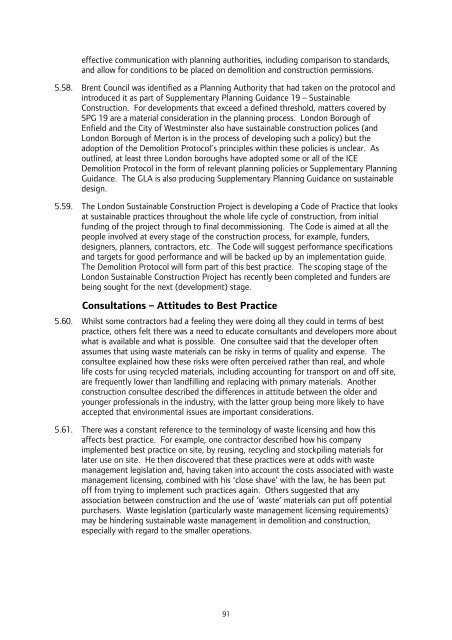London Wider Waste Strategy - London - Greater London Authority
London Wider Waste Strategy - London - Greater London Authority
London Wider Waste Strategy - London - Greater London Authority
You also want an ePaper? Increase the reach of your titles
YUMPU automatically turns print PDFs into web optimized ePapers that Google loves.
effective communication with planning authorities, including comparison to standards,<br />
and allow for conditions to be placed on demolition and construction permissions.<br />
5.58. Brent Council was identified as a Planning <strong>Authority</strong> that had taken on the protocol and<br />
introduced it as part of Supplementary Planning Guidance 19 – Sustainable<br />
Construction. For developments that exceed a defined threshold, matters covered by<br />
SPG 19 are a material consideration in the planning process. <strong>London</strong> Borough of<br />
Enfield and the City of Westminster also have sustainable construction polices (and<br />
<strong>London</strong> Borough of Merton is in the process of developing such a policy) but the<br />
adoption of the Demolition Protocol’s principles within these policies is unclear. As<br />
outlined, at least three <strong>London</strong> boroughs have adopted some or all of the ICE<br />
Demolition Protocol in the form of relevant planning policies or Supplementary Planning<br />
Guidance. The GLA is also producing Supplementary Planning Guidance on sustainable<br />
design.<br />
5.59. The <strong>London</strong> Sustainable Construction Project is developing a Code of Practice that looks<br />
at sustainable practices throughout the whole life cycle of construction, from initial<br />
funding of the project through to final decommissioning. The Code is aimed at all the<br />
people involved at every stage of the construction process, for example, funders,<br />
designers, planners, contractors, etc. The Code will suggest performance specifications<br />
and targets for good performance and will be backed up by an implementation guide.<br />
The Demolition Protocol will form part of this best practice. The scoping stage of the<br />
<strong>London</strong> Sustainable Construction Project has recently been completed and funders are<br />
being sought for the next (development) stage.<br />
Consultations – Attitudes to Best Practice<br />
5.60. Whilst some contractors had a feeling they were doing all they could in terms of best<br />
practice, others felt there was a need to educate consultants and developers more about<br />
what is available and what is possible. One consultee said that the developer often<br />
assumes that using waste materials can be risky in terms of quality and expense. The<br />
consultee explained how these risks were often perceived rather than real, and whole<br />
life costs for using recycled materials, including accounting for transport on and off site,<br />
are frequently lower than landfilling and replacing with primary materials. Another<br />
construction consultee described the differences in attitude between the older and<br />
younger professionals in the industry, with the latter group being more likely to have<br />
accepted that environmental issues are important considerations.<br />
5.61. There was a constant reference to the terminology of waste licensing and how this<br />
affects best practice. For example, one contractor described how his company<br />
implemented best practice on site, by reusing, recycling and stockpiling materials for<br />
later use on site. He then discovered that these practices were at odds with waste<br />
management legislation and, having taken into account the costs associated with waste<br />
management licensing, combined with his ‘close shave’ with the law, he has been put<br />
off from trying to implement such practices again. Others suggested that any<br />
association between construction and the use of ‘waste’ materials can put off potential<br />
purchasers. <strong>Waste</strong> legislation (particularly waste management licensing requirements)<br />
may be hindering sustainable waste management in demolition and construction,<br />
especially with regard to the smaller operations.<br />
91
















